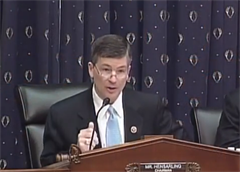Chairman Hensarling Opening Statement at Today’s Full Committee Markup‘We all know that creating jobs, hope, opportunity for the American people -- who have lost way too many jobs, way too much hope and way too much opportunity -- is the number one job we have as Members of Congress.’
Washington,
March 13, 2014
Tags:
Full Committee
House Financial Services Committee Chairman Jeb Hensarling (R-TX) delivered the following opening statement at today’s full committee markup:
We are coming here today to consider five different bills that I believe will help provide regulatory relief to a number of small companies, job creators, as well as community financial institutions that help serve them. We all know that creating jobs, hope, opportunity for the American people -- who have lost way too many jobs, way too much hope and way too much opportunity -- is still, I believe, the number one job we have as Members of Congress. We also know in divided government it is always challenging to find common ground. I want to applaud the members who have worked together on a bipartisan basis today to bring a number of common sense provisions before this committee. We will continue to have very strong disagreements with the overall impact of the Dodd-Frank Act, but I want to commend those who support the overall Act but who understand that in its complexity that there could be some unintended consequences; and that indeed it is right, it is proper, it is our responsibility as Members of Congress when we see that to try to work to address it. And so again, I want to commend the members who have worked together. One, the gentleman from Kentucky, Mr. Barr, the gentleman from Texas, Mr. Hinojosa, on working on something that is an issue I care deeply about -- representing a fair amount of rural East Texas -- that has to do with the designation of “rural” that has come out of the CFPB and how that can particularly impact credit to a lot of my constituents. The gentleman and gentlelady, both from Ohio -- Mr. Stivers and Ms. Beatty -- for their work on what I think in some respects may have been a drafting oversight quite some time ago dealing with the access of privately-insured credit unions to the Federal Home Loan Bank System. The gentleman from Kentucky, the gentleman from Maryland -- working together on capital access for emerging growth companies. Again we saw what great success that the JOBS Act has had. I think this is within that spirit, within that vein. I want to commend both of them for their work. The gentleman from Virginia, Mr. Hurt, the gentlelady from Alabama, Ms. Sewell, for their work on the Small Company Disclosure Simplification Act dealing with the XBRL issue. And then finally, just to make sure we have a reality check, we have at least one bill that is not bipartisan today, so we’re not all dreaming. I want to thank the gentleman from Kentucky for his work on the CLO issue. Then last but not least, this committee will consider what I consider to be probably the single-most important and regrettably least-impactful debate we have in this committee on an annual basis. That happens to be the Views and Estimates on the President’s budget. I kind of guess my side doesn’t like it and the other side does, and we will have a healthy debate over that. But given that the Senate has already announced that they intend not to produce a budget, the President hasn’t really listened closely to the House yet. I’m not sure he’s going to start with this budget submission. But those who are members of this committee know I feel passionately about the ticking time bomb that is literally before us to my left and my right and that is the national debt clock. Regrettably, the President’s budget will exacerbate that problem. His budget will leave the nation $8.3 trillion deeper in debt, or roughly $67,778 per household. And it only gets worse from there. So again, I look forward to perhaps the most important and least impactful debate we have in this committee. But again, I want to thank the members who worked on a bipartisan basis to find common ground to help create jobs for Americans who need them. |


